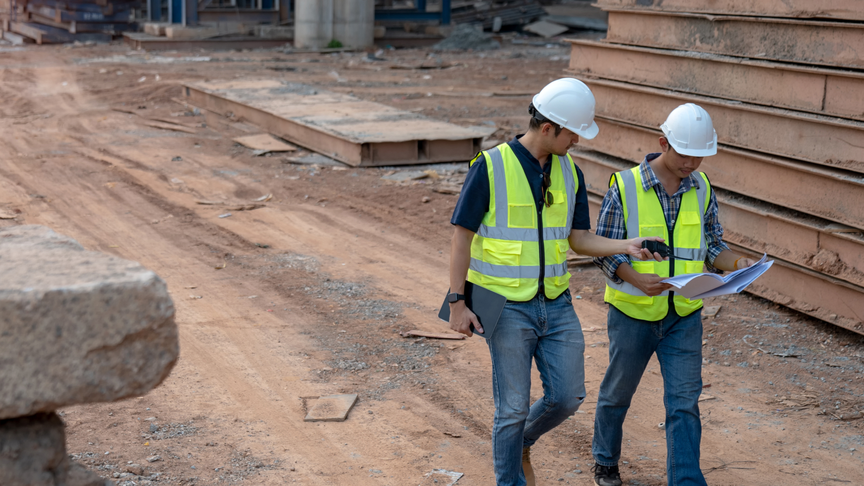The Construction Industry Scheme (CIS): A Guide For Employers
Discover our Construction Industry Scheme guide. Whether you’re a business owner or HR professional, understanding CIS is key for compliance & operations.

The Construction Industry Scheme (CIS) is something anyone managing payroll in the construction industry should be familiar with. But we get it, there are lots of things to consider when running payroll (and it’s not simple), so if CIS deductions are new to you, here’s everything you need to know.
What is the Construction Industry Scheme ?
The Construction Industry Scheme is a tax system where contractors deduct money from their payments to subcontractors and pass it on to HMRC. These deductions contribute to the subcontractor’s annual tax and National Insurance payments.
It was introduced back in 1997, and updated in 2007 and 2014 to make it easier to use. It was intended to be a way to promote tax compliance in the construction industry, which often relies on contracting and subcontracting.
Who is Affected by CIS Schemes?
CIS involves both contractors and subcontractors, though it affects each in different ways. It’s important to keep in mind that it can also apply to your business if you’re spending a large amount of money on construction, even if you’re not a construction firm.
It’s mandatory for contractors to register for CIS.hat means if you hire subcontractors to do construction work, or your business has spent more than £3 million on construction within a 12-month period, you need to register for the scheme.
CIS covers multiple types of business, from large companies to self-employed individuals. They may not always fall within the definition of a construction company, either. A contractor could be a local authority department or a retail business if they’re hiring construction subcontractors.
Who Needs to Register for CIS?
Contractors
Contractors who pay subcontractors for construction work must register for a CIS scheme.
Keep in mind that as a contractor, you need to register for a Construction Industry scheme before taking on any subcontractors. You can do this online by registering as a new employer on gov.uk.
Subcontractors
Subcontractors can register for CIS deductions, but it’s not compulsory. While it may not be essential, it’s advisable to register as a subcontractor as you’ll be lowering your tax bill. This is because unregistered subcontractors will automatically get higher tax deductions of 30% compared with 20% for CIS-registered subcontractors.
If you’re just starting out as a subcontractor business or sole trader, remember that you need to obtain a Unique Taxpayer Reference (UTR), you can get this through Self Assessment registration. Once you’ve got a UTR, it then needs to be activated for CIS, either online or via the helpline.
What businesses are exempt from CIS?
Some types of businesses within the construction industry don’t have to register if they only do certain jobs. These include:
- Scaffolding hire (without the labour)
- Manufacturing materials used in construction
- Delivering construction materials
- Providing construction site facilities such as catering
- Architecture and surveying
- Fitting carpets
- Work paid for by a charity or trust
- Work paid for by a governing body or head teacher of a maintained school on behalf of the local education authority
- Work on the subcontractor’s own property and worth less than £1,000 (excluding materials), which requires contact with the CIS helpline for exemption.
- For “deemed contractors,” CIS does not apply to payments for work on property (not for sale or rent) intended for their own business use, or for a construction contract worth less than £1,000 (excluding materials), also requiring contact with the CIS helpline.
- Direct work for a private homeowner (not a contractor) is exempt, with payments made in full.
- Other consultative work beyond architecture and surveying, such as structural engineering calculations, draughtsmen, and scientists, is also exempt.
- Minor decorating or alterations where the construction work cost does not exceed £1,000, excluding building materials, may also qualify for CIS exemption, subject to HMRC confirmation.
You can find more detailed information and see if your business is exempt on gov.uk.
What are the responsibilities of contractors and subcontractors in CIS?
Contractors
The first responsibility for contractors is ensuring you’re registered before employing any subcontractors on construction projects.
Contractors are also responsible for checking with HMRC that a subcontractor is registered with CIS before paying them. This lets you know how much to deduct for tax.
Remember, a non-registered subcontractor will have 30% deducted while a CIS-registered subcontractor will have 20% deducted. The CIS deductions apply only to the labour portion of payments. They do not apply to materials, VAT, plant hire, fuel, or other expenses.
The contractor is responsible for deducting these payments and sending them to HMRC as a monthly return. These returns must include full information about the subcontractor and the payments made to them. Contractors are also obligated to provide monthly statements to subcontractors within 14 days of the end of each tax month.
Subcontractors
While registering for CIS is optional for subcontractors, and we know, doing it involves filling out another form, but the lower rate of tax makes it worth doing.
It’s the contractor’s responsibility to make the actual deductions from your invoices, but as a subcontractor you should also keep copies of these payments for your own records.
Even though contractors are responsible for making the tax deductions, you’ll still need to accurately report all your CIS deductions on your Self Assessment at the end of the tax year. It’s important to keep in mind that these records need to be kept for at least 3 years.
Having a clear record of payments will also help if you need to claim a refund for overpaid CIS deductions.
How does CIS impact HR professionals and business owners?
If you’re a business leader or HR manager in a construction firmCIS will be part of your monthly tax compliance and invoicing workload.
But what does this actually entail?
It involves ensuring the correct deductions are being made based on the subcontractor’s tax status as determined by HMRC. You’ll be providing monthly returns to HMRC showing these deductions, or informing them that no returns are due if that’s the case in any particular month.
You’ll also be providing your subcontractors with monthly statements to show that you’re making these deductions and payments under the CIS scheme.
CIS compliance
Ensuring you’re following CIS scheme compliance means you and/or your subcontractors are paying the correct amount of tax each month, avoiding any nasty surprises at the end of the financial year. It’s also important to make sure returns are on time and accurate to avoid being slapped with penalties from HMRC.
Penalties for non-compliance
- Late return – HMRC will charge £100 if your CIS return is late by a day. This penalty increases with time. Here’s a full breakdown of the penalties for returns later than one day:
- 2 months – £200
- 6 months – £300 5% of the CIS deductions on the return, whichever is higher
- 12 months – £300 or 5% of the CIS deductions on the return, whichever is higher.
- Later than 12 months – An additional penalty of up to £3,000 or 100% of the CIS deductions on the return, whichever is higher, may be applied. It is also important to note that a penalty can be cancelled if HMRC is informed that no subcontractors were paid that month.
- Incomplete return – Missing or incorrect information on your CIS returns can incur penalties up to £3000.
In Summary
The Construction Industry Scheme is a system designed to promote compliance and clarity for contractors and subcontractors when it comes to paying tax. While it’s compulsory for contractors, it’s advantageous for subcontractors to sign up and get themselves a 10% tax reduction.
Just remember to keep comprehensive records and stay up to date with providing information and payments to HMRC as required.
Streamline payroll with Employment Hero
Staying compliant with the Construction Industry Scheme (CIS) doesn’t have to be complex. With Employment Hero, CIS processing is built into our fully integrated payroll system, making it easy to manage subcontractor verifications, deductions, and reporting in line with HMRC requirements.
Our platform automatically handles CIS deductions, submits monthly returns to HMRC, and keeps records up to date, so you can reduce admin, cut down on errors, and stay compliant with confidence.
Our Employment Operating System combines payroll, HR, hiring, and more into one intelligent platform.
One system, everything employment.
Related Resources
-
 Read more: 7 Ways Employment Hero Can Help You Retain Top Talent
Read more: 7 Ways Employment Hero Can Help You Retain Top Talent7 Ways Employment Hero Can Help You Retain Top Talent
Contents Retaining top talent in 2026 is about more than providing a positive workplace culture; employees are looking for jobs…
-
 Read more: Bradford Factor Alternatives: Practical Ways to Manage Absence in 2026
Read more: Bradford Factor Alternatives: Practical Ways to Manage Absence in 2026Bradford Factor Alternatives: Practical Ways to Manage Absence in 2026
Discover smarter absence management strategies for 2026. Explore Bradford Factor alternatives that focus on employee wellbeing and building a resilient…
-
 Read more: Government red tape risks blocking youth jobs as SMEs look to access apprenticeship scheme
Read more: Government red tape risks blocking youth jobs as SMEs look to access apprenticeship schemeGovernment red tape risks blocking youth jobs as SMEs look to access apprenticeship scheme
February 9, 2026: New Employment Hero research finds 73% of SME leaders intend to leverage new Government apprenticeship schemes following…




















